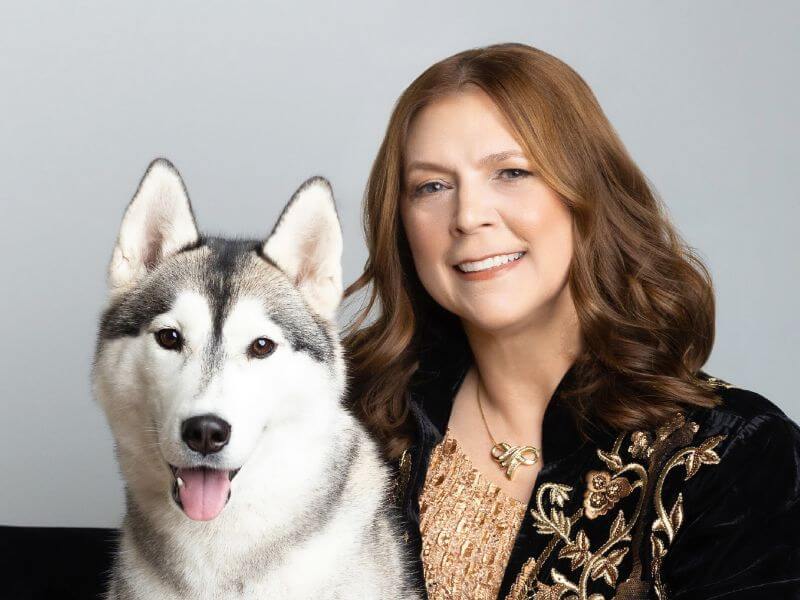
Home » Interview With Breeder/Owner Handler Melissa Arab

Melissa Arab: We brought home our first (pet quality) Siberian Husky in 2003 because my husband had always admired the breed. She was a “trial by fire” for us as we had never owned such an independent-minded dog before, but we adored her and adapted to the quirks of the breed. My children immediately became involved in Conformation matches with her and our other mixed breed family dog through their 4-H group, K9 & Kompany. Our oldest daughter asked for a “real” show dog for AKC competition for her 10th birthday. We started doing our research and talking with reputable breeders to find our first well-bred Siberian Husky.
Melissa Arab: I have lived my whole life with large dogs. I became involved with Conformation as an Owner Handler around 2005 and with breeding around 2007. My daughter and I have finished dogs in AKC, Canada, Slovakia, and the Czech Republic.
Melissa Arab: I have attended numerous handling classes and seminars. I have also been open to deep discussions of dogs and handling with everyone I meet at the shows; friends, professional handlers, other breeders, and comments from the judges who are kind enough to provide them. I find I can learn something new from everyone. I’ve been handling my dogs since 2005, but I still learn something new at every single show.
Melissa Arab: I find there is a great deal of information on YouTube and various Facebook groups dedicated to owner handlers.
Melissa Arab: This is my first year competing for a ranking in the AKC Owner-Handled Series. My primary focus is spending this irreplaceable time with my dog and friends, but I get a lot of satisfaction watching “Arya’s” name climb up the rankings. I know the ribbons and points are meaningless to her, but it brings me joy to see what we have accomplished together as a team.
Melissa Arab: The Bred-By Class is extremely important to me. It says to the world, “I produced this wonderful dog.” I finished my current special from the Bred-By Class and will always utilize the Bred-By Class when showing my own puppies. I was thrilled to see the division of Bred-By between Puppy and Adult, so my puppy would not miss the Puppy Competitions when entering Bred-By Classes. I would really love to see the rules change so that Champions could also participate in Bred-By Competitions at the shows. My pride in this dog that I produced didn’t stop when she became a Champion. I would love to be able to show that she is Breeder/Owner-Handled while still competing in the Champion Class.
I know the ribbons and points are meaningless to her, but it brings me joy to see what we have accomplished together as a team.
Melissa Arab: There are quite a few longtime Breeder/Owner Handlers in our breed as well as professional handlers and judges who are also breeders of our breed, so the quality of the competition is generally extremely high. This can make it a challenge for newer exhibitors, but the good news is that there are a number of wonderful, warm people in the breed who are willing to help out new exhibitors.
Melissa Arab: I would not be able to narrow it down to one specific person for mentoring as I have made so many wonderful connections, both in my breed and in many other breeds. I have helped many of these colleagues and friends when they needed extra hands in the ring and learned a great deal from each of them. The same applies to breeding. I have always been open to discussions with all of my breeder-friends and colleagues, regardless of their breed, and have picked up much invaluable information through the years.
Melissa Arab: According to AKC, more than 80 percent of show dogs are owner-handled. This is a pretty staggering number and it’s vital to both the breed and the sport to keep these Owner Handlers engaged.
I have always been open to discussions with all of my breeder-friends and colleagues, regardless of their breed, and have picked up much invaluable information through the years.
Melissa Arab: First and foremost, collaborate with your dog’s breeder. They are very familiar with the dogs in the pedigree behind your dog and can be helpful in finding a great match or avoiding a detrimental one. Second, familiarize yourself with all of the genetic conditions that are prevalent in your breed and test your dogs thoroughly to ensure you will not perpetuate problems in the breed. Third, have a network of other breeders who can help with your questions. Lastly, breed the best to the best and hope for the best. Life does not come with any guarantees, so you will unfortunately have to be prepared for the heartache that will undoubtedly go hand in hand with intertwining your heart with your breeding efforts.
Melissa Arab: I am genuinely just enjoying every precious moment with my current two-year-old special, Arya, knowing that the time I have with her will never be long enough. She hasn’t received a regular Group placement yet, but she is still physically immature. This is something I hope we can accomplish next year.
Melissa Arab: On my very first day showing in an AKC show ring, I was told to keep an eye on the ring procedure in the classes before mine, so I would know what to do when I went in. I watched closely as several pro handlers in a large class did their down and back, then moved around the ring to the end of the line where they circled their dog with a smooth flourish, free-stacking them in reverse. It was quite impressive to me as a new exhibitor. So, when I went into my class of one, the judge told me to just move around the ring and set up on the other side.
I, of course, did as she asked and then imitated the “pro handler move” of circling my dog at the end to show the judge the opposite side with the dog facing me in reverse, which, unfortunately, left the dog’s rump toward the gate. The judge stood and looked at me for a moment and then asked me to stack my dog correctly. While I corrected the stack, she began scolding me, saying in all her years of judging she had never been presented with the dog’s butt for examination. The dressing down by the judge was embarrassing, but I laugh about it now. It has become a great story to tell new people when they feel they have made some mistake in the ring. It generally makes them feel better about whatever they did.